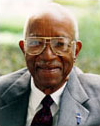John Hope Franklin
| John Hope Franklin | |
|---|---|
 |
|
| Born |
January 2, 1915 Rentiesville, Oklahoma, United States |
| Died | March 25, 2009 (aged 94) Duke University Medical Center Durham, North Carolina, United States |
| Alma mater |
Fisk University (B.A., 1935); Harvard University (M.A., 1936; Ph.D., 1941) |
| Occupation | Scholar, historian, author, professor |
| Spouse(s) | Aurelia Whittington Franklin (m. 1940; d. 1999) |
| Honors |
|
John Hope Franklin (January 2, 1915 – March 25, 2009) was an American historian of the United States and former president of Phi Beta Kappa, the Organization of American Historians, the American Historical Association, and the Southern Historical Association. Franklin is best known for his work From Slavery to Freedom, first published in 1947, and continually updated. More than three million copies have been sold. In 1995, he was awarded the Presidential Medal of Freedom, the nation's highest civilian honor.
Franklin was born in Rentiesville, Oklahoma in 1915 to attorney Buck (Charles) Colbert Franklin (1879-1957) and his wife Mollie (Parker) Franklin. He was named after John Hope, a prominent educator who was the first African-American president of Atlanta University.
Franklin's father Buck Colbert Franklin was a civil rights lawyer, aka "Amazing Buck Franklin." He was of African-American and Choctaw ancestry and born in the Chickasaw Nation in western Indian Territory (formerly Pickens County). He was the seventh of ten children born to David and Milley Franklin. David was a former slave, who became a Chickasaw Freedman when emancipated after the American Civil War. Milley was born free before the war and was of one-fourth Choctaw and three-fourths African-American ancestry. Buck Franklin became a lawyer.
Buck Franklin is best known for defending African-American survivors of the 1921 Tulsa race riot, in which whites had attacked many blacks and buildings, and burned and destroyed the Greenwood District. This was known at the time as the "Black Wall Street", and was the wealthiest Black community in the United States, a center of black commerce and culture. Franklin and his colleagues also became experts at oil law, representing "blacks and Native Americans in Oklahoma against white lawyers representing oil barons." His career demonstrated a strong professional black life in the West, at a time when such accomplishments would have been more difficult to achieve in the Deep South.
...
Wikipedia
